
Who Do We Owe and How Much?
Economics /
US Debt
Jul 19, 2007 - 12:13 AM GMT
By: Mike_Hewitt

This essay takes an in-depth look at the magnitude and consequences of the large debt levels within the United States. Topics discussed include: composition of foreign and domestic holders of U.S. debt, consequences of the government borrowing from the Federal Reserve, and a look at the current U.S. housing market.
The National Debt
The national debt (also known as public debt) is money owed by the federal government. As the government represents the people, government debt can be seen as an indirect debt of the taxpayers. The U.S. government incurs debt by issuing treasuries (bills, notes and bonds).
These securities are either sold on the open market or directly to the Federal Reserve. The U.S. public debt, as of July 17, 2007 stood at $8.887 trillion. In addition to the national debt, the State and Local debt at the end of 2006 stood at just over $2 trillion.
Some consider that all government liabilities, including those that the government has contracted for but not yet paid, should also be included in the national debt . Corporations must report such liabilities in their annual financial statements under GAAP (Generally Accepted Accounting Principles).
These "off-balance sheet" items include future payments for federal pensions, Medicare and Social Security. Inclusion of these obligations would dramatically increase the U.S. national debt to $59.1 trillion or 403% of GDP! On a per capita basis this amounts to $516,348 for every U.S. household! By means of comparison, the average American household owes $112,043 for mortgages, car loans, credit cards and all other debt combined.
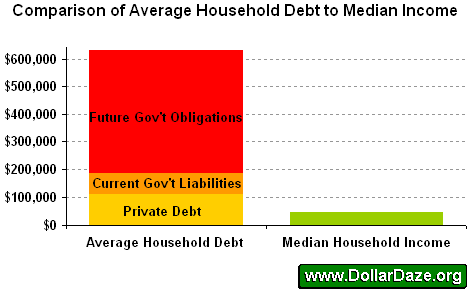
To Whom Do We Owe the Public Debt?
The U.S. Treasury publishes a listing of the Major Foreign Holders of the public debt.
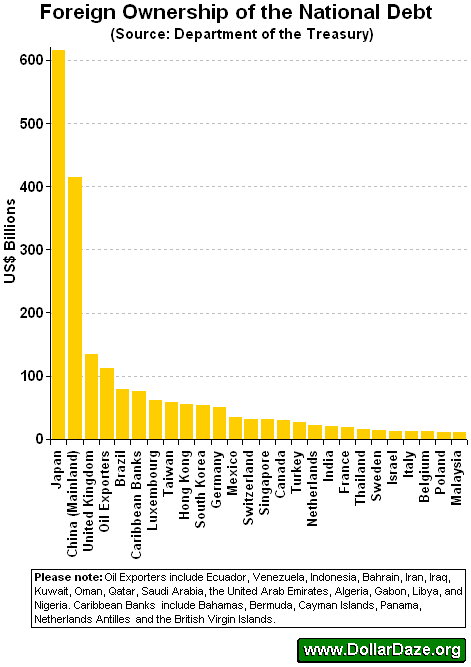
Of the U.S. debt owned by foreigners, central banks own 64% with private investors owning nearly all the rest ( Analytical Perspectives - Budget of the United States Government, Fiscal Year 2006 p. 257 ). As of the end of 2006, U.S. treasuries made up 33% of Mainland China's official foreign exchange reserves and 68% of Japan's!
The magnitude of the foreign-owned portion of the national debt is nearly three times the total amount of currency in circulation! Official numbers released by the Federal Reserve for June 2007 show the volume of currency at US$755 billion .
The Department of the Treasury publishes The Debt to the Penny and Who Holds It . This up-to-date information divides the debt into two sections – Public and Intergovernmental Holdings. The former grouping includes U.S. citizens and foreigners.
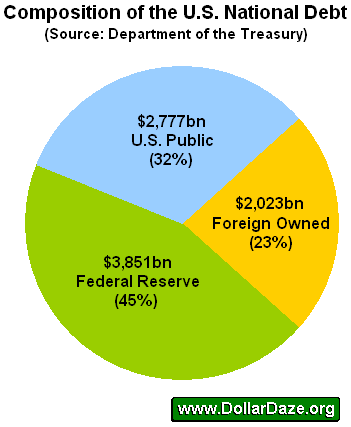
The Federal Reserve
The Intergovernmental Holdings section refers primarily to governmental borrowing from the Federal Reserve. This is sometimes referred to incorrectly as "the government borrowing from itself".
To begin with, the twelve regional Federal Reserve Banks are private institutions operating collectively in a quasi-governmental capacity. When the government spends more than it receives in tax revenue, it experiences a budget deficit. To make up this shortfall, it issues new debt. This takes the form of treasuries that are sold on the open market. When there is not sufficient interest in the open market to buy up the required number of treasuries, the government will turn to the Federal Reserve, otherwise known as the "lender of the last resort".
When the government "borrows" from the Federal Reserve, both the treasuries and the money are literally created out of thin air. These newly acquired government securities increase the assets of the Federal Reserve Bank. This enables it to lend out many times that amount through the fractional reserve banking system. The process, known as "monetizing the debt", is inflationary.
For example, let us assume that the legislated reserve ratio is 10% and the government requires US$10 billion from the Federal Reserve to cover a shortfall. The government creates US$10 billion in government bonds to give to the Federal Reserve who issues US$10 billion in newly created money to the government. Interest payments on these bonds are paid for by tax revenue and/or additional deficit spending. The Federal Reserve may now legally lend out US$100 billion.
This credit expansion as a direct result of the U.S. government borrowing from the Federal Reserve dilutes the value of all outstanding currency. When the value of the dollar goes down, prices go up. In effect, it is theft from everyone who holds U.S. currency because they can now buy less with it today than they could have before.
The U.S. Total Debt
The Federal Reserve's publications, Flow of Funds Accounts of the United States (also known as the Z.1 Releases) contain a great amount of data regarding money flows between various sectors. Missing from this data set is the portion of debt owed by the federal government to the Federal Reserve. To retrieve that data, one must subtract the Gross Federal Debt held by the Public from Gross National Debt published by the St. Louis Federal Reserve. This data should be added to the Federal Government Debt figures in table D.3 of the Z.1 Release to account for the complete national debt.
The following chart shows accumulated debt from the national, household and corporate sectors from 1956 to 2006.
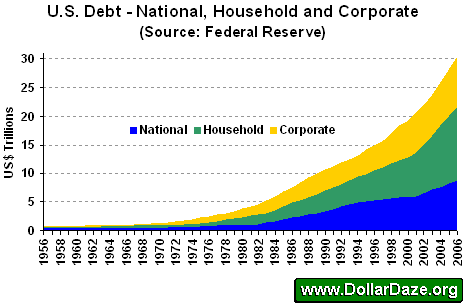
The Housing Bubble
The household sector has surged nearly 50% since 2001, increasing from $7.66 trillion to 12.82 trillion in 2006. Most of this jump is attributed to mortgage debt that has risen 83% since 2001. This has been what market analysts have been referring to as the "Housing Bubble". Starting in 2001, ordinary citizens became attracted to an increasingly speculative real estate market.
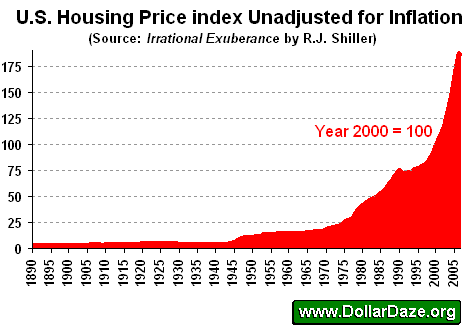
The combination of increasing money supply ("liquidity") and advent of 40-year low interest rates along with exotic loans (negative amortization, adjustable rate, buy-down, no credit check) encouraged heavy leveraging as house buyers attempted to purchase more expensive houses in hopes of reselling them in a few years at a much higher price to another buyer.
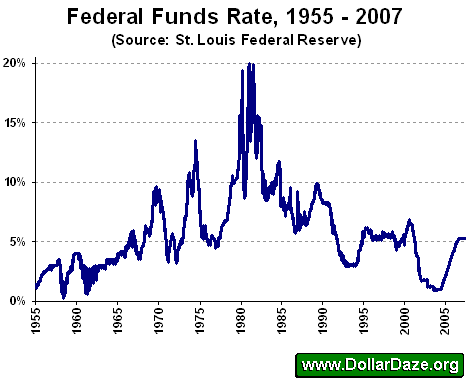
Marketing of these types of loans reached a crescendo in late-2004 and early-2005. The sub-prime industry offered buy-down mortgages whereby the buyer would pay a discounted interest rate for the first few years (otherwise known as a "teaser rate"). These low starter payments were marketed so that the buyer could "afford home furnishings and renovation projects". When it came time for these interest rates to readjust, many homeowners found that they were unable to cover their monthly mortgage payment.
As a result of this, the U.S. is currently experiencing a financial meltdown in the sub-prime mortgage industry within the U.S. To date, 99 firms have either gone bankrupt or have dramatically transformed their business. Over 1.4 million homes are currently in some stage of the foreclosure process.
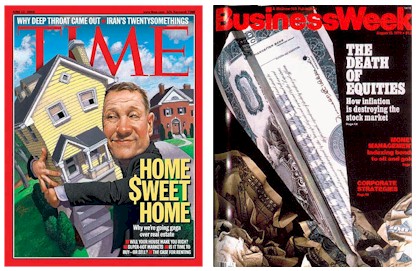
Time's June 13, 2005 cover article of "Home $weet Home" was taken by some to be indicative of a speculative top and a portent for an upcoming market reversal. Just as Business Week's famous August 13, 1979 cover story called for the end of the stock markets at the moment when the largest bull run was just getting underway.
But "We Owe it to Ourselves"?
Does the debt matter, after all, don't we owe it to ourselves? Only if you acknowledge that "we" and "ourselves" are in fact very different entities. The Federal Reserve's Z.1 Release gives insight as to who exactly owes the money, and to whom.
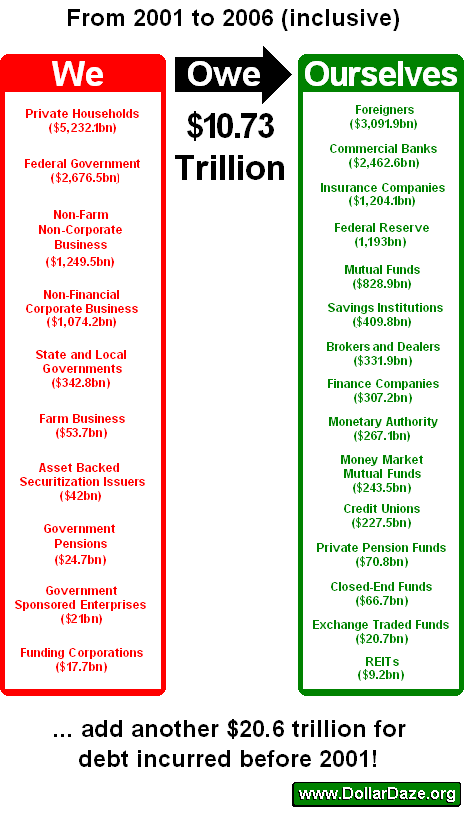
Clearly this is a one-way street. Households, government and non-financial businesses are becoming more and more indebted to foreigners, banking and financial institutions. Debt is not wealth. It is a claim on future production.
"The budget should be balanced; the treasury should be refilled; public debt should be reduced; and the arrogance of public officials should be controlled." - Cicero. 106-43 B.C.
By Mike Hewitt
http://www.dollardaze.org
Mike Hewitt is the editor of www.DollarDaze.org , a website pertaining to commentary on the instability of the global fiat monetary system and investment strategies on mining companies.
Disclaimer: The opinions expressed above are not intended to be taken as investment advice. It is to be taken as opinion only and I encourage you to complete your own due diligence when making an investment decision.
© 2005-2022 http://www.MarketOracle.co.uk - The Market Oracle is a FREE Daily Financial Markets Analysis & Forecasting online publication.
Comments
MARY
17 Aug 08, 19:06
|
George Bush!
THIS IS ALL BUSH'S FAULT!!!!!!!!!!!!!!!!!!!!!!!!!!!!!!!!!!!!!!!!!!!!!!!!!!!!!!!!!!!!!!!!!!!!!!!!!!!!!!! HES A LIAR AND A CROOK!)=SOMEONE NEEDS TO STOP HIM!!!!!!!!!!!!!!!!!!!!!!!!!!!!!!!!!! HES GOING ON MASS DESTRUCTION!!!!!!!!!!!!!!!!!!!!!!!!!!!!!!!!!!THAT DEBT COULD OF BEEN TOTALLY PREVENTED!!!!!!!!!!!!!!!!!!!!!!!!!!!!!!!!!!!!!!!!!!!!HE KNEW IT!!!!!!!!!!!!!!IM SO FRUSTRATED!!!!!!!!!!!!!!!!!!........................................................................................
|
N/A
18 Sep 08, 09:29
|
George Bush!
I don't believe it is all George Bush's fault...Im pretty sure we have been in debt for awhile! Blame it on everyone...The whole U.S. is money hungry!
|
jtdrofnas
07 Oct 08, 15:01
|
everyone
From citizens to corrupt politicians. Greed is what drives us today, that and the quick and easy for short-term fixes, we forgot about long term. and if we didn't forget, (corrupt)(or not) politicians guessed it would have been fixed after their term in office. For us American citizens not knowing at the time that it was going to be a big issue went into credit card debt and common scams to get by or get what you want (ed) (greed). But we blame our presidents such as bush, i don't think hes all to blame, hes to blame for not recognizing it sooner. but all the presidents shortly after the 1970's as statistics show have went into debt. I believe the Clinton administration is somewhat to blame also. We american citizens always blame those in charge, it might never change until we see ourselves also the problem. and with these charts I have seen us (citizens)of the problem.
|
Tony Molson
02 Feb 09, 10:17
|
National Debt
Here is the underlying problem. WE do not make anything in the USA anymore. Companie's outsourced production to lower labor Nations like China and imported the products back so we could buy them cheap in the USA. Problem is that we used debt to buy the products and we sent Billions of dollars oversees. All the politicians can say is that this form of Free Trade is Good. Why.... because the Asians hold our IOU's and if we try to change things they will dump the US Currency, stop buying our Paper and tank the dollar. Either way bad policy by our elected officials have led us down this path.
|
Thomas Jefferson
16 May 09, 04:20
|
You are missing the real cause!!!!
The real cause is the privatly owned Federal Reserve. The Government signed over the right to print/create money to the Fed, now you have to borrow money from them, which they create out of thin air, and which has to be paid back with interest. If Congress regained control of the issuing of the currency there would be no debt.
|
jtdrofnas
11 Jul 09, 22:41
|
correction - US Banks
The Rockefeller's and the 10% of the wealthiest people are to blame. what most people dont believe is that the united states federal reserve banks isnt even owned by the u.s. its a privately owned bank not even regulated by our government. "Thomas Jefferson" or the man who first commented knows what im talking about. maybe i can offer a lil more and request that we all watch the zeitgeist movies (for free) at zeitgeistmovie.com
|
Eric
24 Sep 09, 12:06
|
Mary
Mary, you are an idiot.
|
John
01 Nov 09, 21:10
|
National Debt
This debt has been with the United States for Decades. What's your plan. What's your solution?
|
John
27 Nov 09, 02:58
|
The facts
We had a balanced budget just a few years ago. I mean , doesn't the guy who wrote this know that betting on derivaties amplified this expotentionly.
|
enygma
02 Dec 09, 17:52
|
the real reason
Ok look the reason for use being in debt is a multiple number of things 1. congress, due to them signing over to the feds is the biggest reason that is what tipped us over to plummet into debt, also congress (NOT the president) can declare war so war debt is another reason. 2. the president, yes president bush saw it coming yet he sat and did nothing and so we start getting deeper into debt, then we get in a war on terrorism witch make it worse. 3. the people, yes we also are part of the problem well mostly the people who get scared and widthdrawl all of there money from the banks and then stuff it somewere and never take it out, so the money that we need to get out of debt is probably stuffed into a matress or buried in the ground or even in a safe. for the now and future all of the people who kept there money in there house needs to get it out there into the world so that it circulates to the people that need it AND so that it pays off our national debt, and the government needs to stop spending money on stupid things so that way that certain money can go to paying for our debt. now i am only stating facts that i know of, i know some of you hate bush and want to blame him for everything but remember there are other factors in work here.
|
ThePitbull
25 Dec 09, 23:01
|
Bush
Bush? You blame $60 Trillon on one president? You actually give him that much credit?? This has been a boiling frog since 1913. Read the Creature from Jekyll Island
|
spa
22 Jan 10, 13:11
|
Bush?!! try Barney Frank
Bush?!!! About trying Barney Frank and the "Community Reinvestment Act", empowering regulators to punish banks that failed to "meet the credit needs" of "low-income, minority, and distressed neighborhoods". And his best buddies on charge: Fannie Mae and Freddie Mac. BS BS BS, I can't believe people is actually blaming any other one but Frank and his crooked deals with FM & FMc, and let them get away with it!!
|
toyotawhizguy
24 Jan 10, 02:22
|
Take a close look at Clinton
Enough ranting on about Bush! Guess which president signed the "Community Reinvestment Act" into law? It wasn't Bush. Do your research before you rant in all caps!
|
EPHeidner
24 Jan 10, 16:08
|
National Debt with a nod an a wink
I rest easy at night knowing the off balance sheet assets of the US Government more than cover the debt. The key issue is that the few people who understand this don't want control of those assets returned to the public domain. Check the works of Wanta, Sterling, Durhamn and Heidner to understand this. Rest well......
|
Keith Jones
04 Feb 10, 19:43
|
Long argument but blame the public in the Clinton years
Look at the graph under the US Total Debt section. Looks pretty much like an exponential curve, which indicates a fairly constant level of inflation (e^(1+inflation)). However, look at the changes in the relative amounts of that debt. During 1994-2001, the national debt reduced relative to what the exponential curve would predict but then increased again a rate that might match a continuation of the exponential curve at 1994. The corporate portion of the graph shows a normal exponential curve with a slight glitch 1997-2000, but then appears to stay constant (the gradient is the same as that of combined national and household debt). The household debt at first looks like a normal exponential up to 2001, but this isn't accurate because between 1994 and 2001 it is actually counteracting any 'savings' being made in the National debt - i.e. it has stepped up. After 2001 it is more difficult to read, due to the sharp change in National debt, but I'd say that it is more or less matching the inflationary exponential rate.
|
Keith Jones
04 Feb 10, 19:43
|
Long argument part 2
During 1994-2001 when the government was paying off its debts (times are good?), the public started significantly increasing it's debts. When the government stopped saving and carried on as normal, the public was unable to reduce it's higher levels of debt. Corporations presumably creamed the profits of interest which allowed them to reduce their relative debt. Conclusion : The debt incurred by households in 1994-2001 was unmaintainable but took some years (perhaps liquidating assets to make ends meet) before it became critical and everyone started defaulting on their debts.
|
Cody
03 Mar 10, 10:07
|
Debt,healthcare,social security
Well if Obama and the government would Stop spending all of OUR money, we could start payin some of this off. People for many years have been puting money in Healthcare and Social Security and Obama and the Government is taking OUR money and Spending it.
|
15 Mar 10, 11:59
|
Debt fix
Lots of grumping but no solutions. Maybe we should start selling off land since we can't seem to live within our budget.
|
Andrew Reed
18 Mar 10, 10:28
|
F Bush
Its not bushes fault (he's retarded) its the governments. F the government! Anarchy!!
|
sally sue
22 Mar 10, 11:03
|
debt
we suck were makeing ourselfs go into debt so we are all dumb:) wada go america u scrued ourselfs over go buy a house or throw money at a bank if you want to help the debt
|
Macabre215
11 Apr 10, 12:40
|
Carter not Clinton
The Community Reinvestment Act was signed in 1977, toyotawhizguy should stop being hypocritical and do his own research before putting a title like "Take a close look at Clinton".
|
Macabre215
11 Apr 10, 12:48
|
To spa
Also to spa about Barney Frank, it actually was Bush that caused the housing market to crash after putting less regulations on mortgages by putting people in houses they couldn't afford...... Barney Frank was opposed to what Bush was doing, from which Bush can be blamed.
|
paul
14 Apr 10, 11:27
|
federal spending
Before the 2009 take over by Obama, Pelosi and Reed the average person owed a bit over $30,000 towards the national debt, each household owed almost $100,000 toward the national debt. THIS MEANS THAT OUR FEDERAL GOVERMENT AND THE PEOPLE WE ELECT TO REPRESENT US AND TO LOOK OUT FOR OUR BEST INTERESTS HAVE SPENT ALL OF THE ASSETS THAT WE AS CITIZENS HAVE WORKED A LIFETIME TO ACCUMULATE, IN HOPES TO FUND OUR RETIREMENT AND PROVIDE SOME KIND OF AN ESTATE FOR OUR HEIRS. NICE GOING FEDS, NOW THE OBAMA, PELOSI, REED ADMINISTRATION HAS ALMOST DOUBLED THAT AMOUNT.
|
jose sosa
25 May 10, 19:51
|
deep deep recession
we've been sold out,by the very people we've elected. this here is exactly what the one responsible love to foment, to blame certain individuals,to blame the dem or rep ,it's all of them the military industrial complex, congress, our fearless god leaders, the central banking system, all three branches, yet it's our fault and to a point not our fault. we've entrusted public servants to do our bidding and like a plumber or an electrician you just cannot know what it is they are doing, but a kind face and endearing personality we disarm ourselves and make the mistake of trusting someone.maybe the tv in which i truly believe has a big part of dumbing us down, improper public education,lack of research, and yes pres. wilson screwed up big time , but he knew and regreted the nail in the cross mistake by allowing the federal reserve to print money out of thin air and controll, literally control our fate as a nation, our constitutional republic and everything this country stood for. we've been sold out to the real criminals of evil. this is not by chance but by deliberate and calculated and well funded by the ones who literally owns each and every one of us. are we not soveriegn people?
|
moe
03 Jun 10, 09:31
|
debt
we are in debt??????????
|
N/A
11 Aug 10, 14:42
|
Debt
So if America pay all this money out to China there will be no econmy. Am I right Or Wrong YOU DECIDE !!!
|
Blundering Baldman
27 Sep 10, 09:29
|
The borrower is servant to the lender.
The federal reserve likes us to be in debt to them. The bible says that the borrower is servant to the lender. When our debt is high enough they will confiscate our gold, and this time silver too, just like they did in the 1930's. The price of gold isn,t quite high enough yet...................
|
randy
07 Dec 10, 00:19
|
Stop China
Bush did spent a lot of money but he also created hundreds of thousands of jobs. (sure Dick Cheney and Bush personaly had their hads on some of that money) Do you realize what out unemployment rate would be today if that money was never spent. Its not just one person to blame, the gov is way to big and huge corporations have politicians coming out of their pockets. The gov needs to stop all the hand out and make people work for the money they get FILL THAT POTHOLE if you want your unemployment check. the only way to compete with China (who owns 2.7trillion of our debt) is our own form of cheat labor. where would we get that???? how about all the people on wellfare? stop spending taxpayers money on prisoners, if they want to eat make them work for that food. Why should my money go to sustain someone that raped 6 young girls and murdered others? If I owned a corporation that GM and I had union people demanding to get paid 50+ a hour for standing on an assembly line with no education I's sure out source to mexico too. THE PROBLEM WITH AMERICA IS AMERICAN'S!!! everyone wants to get rich but no one wants to work anymore. were never going to get out of this and most of my peers age 24 and no idea how out of control this is and how were going to suffer when were older.
|
js
07 Dec 10, 11:53
|
why the surprise?
So you have a private financial industry that makes money from debt and debt based products, kill the economy with debt and gambling on top of the debt, expect a bailout and you want to blame public spending? right wing idiots. DOn't worry, the UK have just as many of them as the U.S. Wall st. find a way of making borrowing even cheaper and more plentiful and tell the government that credit is the way forwards, and the only problem is that there isn't enough credit. More people should be borrowing more to gain assets. Sensible right? What makes this activity possible, other than the criminal activity in rating debt, is that the casino that is derivatives are gambled, sorry traded OTC (over the counter) not on an exchange. this means that institutions take on unlimited amounts of it with no outside inspection of the products and no accounting for where the [leveraged] money comes from to do these trades. Why do you think the losses are so collossal and bailouts so large? Think about it, when you buy a security, its from an exchange where other market participants implicitly 'rate' it. If you pay too much or too little, you lose, or profit but the only 'danger' is if everyone borrowed everything invested and lost. but they don't - they can't. The system 'cannot' go bust. If derivatives were traded on an exchange, their 'true' value would be far more apparent and the worst excesses would be automatically curtailed, and be subject to normal trading disciplines. Asset prices couldnt be inflated. Massively speculative derivatives would never exist. Problem solved. Of course the institutions won't allow this. They wouldn't make the huge amounts of money they do right now because most derivatives wouldn't make any sense. This means we get a bust system as bets go the wrong way. And because the economy can't function without banks we have to bail them out - including their gambling losses. We might have been on a long path to txfer of wealth to the far east, but boy have we accelerated it. In a decade, we will not have the same NHS, or education system cos it will be unaffordable. Private services will cost too much and we won't re-recruit govt employees for nurses / doctors.
|
j.r.
22 Apr 11, 09:03
|
US debt
if you look at the debt we owe 77% of it to either ourselves or our goverment. lets just call it even. Why the hell does the goverment owe itself money??? we need to close our boarders and become self reliant and tell the rest of them to go stick it and that they aren't getting any more from us. We have the oil and everything else we need. We have become a county with our hand out and now it's run over into our goverment. People we need to get off our asses and wake up before we get woke up one day by another country taking over not by war but because they have come to repo our ass.
|
Larry Flinchpaugh
21 Aug 11, 16:36
|
Federal Reserve Audit
Doesn't the recent Fed audit show them loaning out $16 trillion dollars. Surely that did not come out of their own funds. If that is true, wouldn't the US debt then be increased from $14 trillion to $30 trillion?
|
joy kirby
14 Sep 11, 09:06
|
bush
bush is a dumb ass look at at the $ we owe china i planed on goin there for my summer so im scared to go now
|
hunter
16 Sep 11, 09:26
|
debt
weve been in debt since we were introduced to america in the 1700s
|
LK
14 Oct 11, 12:36
|
debt to Europe
Our debt to Europe is really obsolete--considering we protected and completely rebuilt them with our own funds after the World Wars . . . In all honesty, they have nothing valid to hold us too . . .
|
gary
02 Nov 11, 11:45
|
free for all trade policy must stop
The sad truth is that anything that can be made can be made cheaper someplace else. So why not send all manufacturing jobs out of the country. Now we can also import all of our food as well. All we hae to do is print money, right? The jobs must come back before the FED goes bankrupt. Then we will have neither jobs or money for the poor. We have become like a great eagle that is trading feathers for fish. Or like a farmer who trades land for food. This free for all trade policy must stop
|
Larry Flinchpaugh
03 Jun 12, 20:15
|
Amount owed to the Fed.
This web site shows 45% owed to Fed but the KC Fed Chairman said 24% of the 15 trillion and another says that it is 11%. Who is correct? If the Fed were abolished today, how much would they say the tax payers owned them?
|











